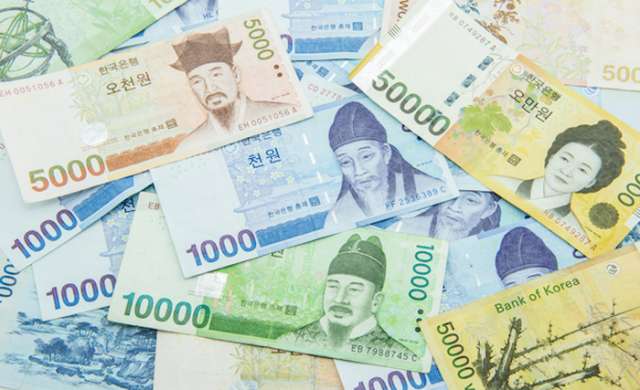While the bank does remain “overweight” the country vis-à-vis investing benchmarks, it has reduced that stance from 15 percent overweight to only 5 percent. Reason #1: It looks likely to offer negative value creation over the next year. South Korea is one of only three emerging markets projected by Credit Suisse to offer negative value creation over the next year.
What does that mean? Well, the country’s 12-month forward return on equity is 9.8 percent, while the 12-month forward cost of equity is 12.5 percent, according to Credit Suisse. Not only is that 270 basis point differential the largest it’s been in a decade, it is also 290 basis points inferior to the overall emerging market average.
What’s behind the gap? Net profit margins have fallen from 6.3 percent in 2004 to 3.9 percent in 2014, in part because growth in real wages has outpaced productivity growth. Reason #2: Earnings revisions are amongst the weakest in emerging markets. Earnings revisions breadth for South Korean equities has been in negative territory for 42 straight months, since August 2011.
Consensus earnings per share estimates for 2015 have come down by 25% over the past 14 months, with 2016 right alongside them. Of 16 emerging markets covered by Credit Suisse, Korea is seventh weakest in terms of earnings revisions, and the third weakest in non-Japan Asia after Malaysia and Thailand.
The sectors faring the worst in this category are financials, discretionary and consumer staples. Revisions for the technology sector, on the other hand, have improved.
Reason #3: The weak yen. Korean exporters are particularly challenged by the relative weakness of the yen owing to the considerable overlap of Korean and Japanese export sectors.
Credit Suisse forecasts that the won will continue to strengthen against the yen over the next 12 months, to 8.7 from 9.3 currently. There’s no relief in sight over the longer term, either: the yen is likely to remain soft as the Bank of Japan’s monetary policy is expected to remain highly accommodative. Reason #4: Paltry dividends. Korea has one of the worst payout ratios and dividend yields available across emerging markets.
Over the past two years, it averaged less than a third of the overall emerging market payout ratio. What’s more, Korean companies are holding onto increasing amounts of their cash: the spread between Korean companies’ free cash flow yield and their dividend yield is the highest it’s been since 2004. Recent legislation may encourage more dividends, however.
In December 2014, the Korean National Assembly passed a corporate accumulated earnings tax, which penalizes large corporations for holding excessive cash reserves on their balance sheets.
Reason #5: Industrial production is headed in the wrong direction. Demand for Korean exports has been falling of late: Exports slipped 3.4 percent in February from a year earlier, the largest drop in two years. And that’s having a negative impact on industrial production, which fell 3.5 percent in January – the largest since the global financial crisis consistent with declines in important indicators of auto and machinery production. Credit Suisse expects industrial production to remain sluggish throughout the year.
While February’s manufacturing PMI survey is in line with forecasts for 4 percent GDP growth in 2015, analysts have been lowering their estimates for 2015 and 2016 growth since late last year. - See more at: https://www.thefinancialist.com/five-reasons-to-be-cautious-about-korea/?utm_source=taboola&utm_term=ndtv&utm_campaign=Global#sthash.BEutJ4M1.dpuf
More about:
















































